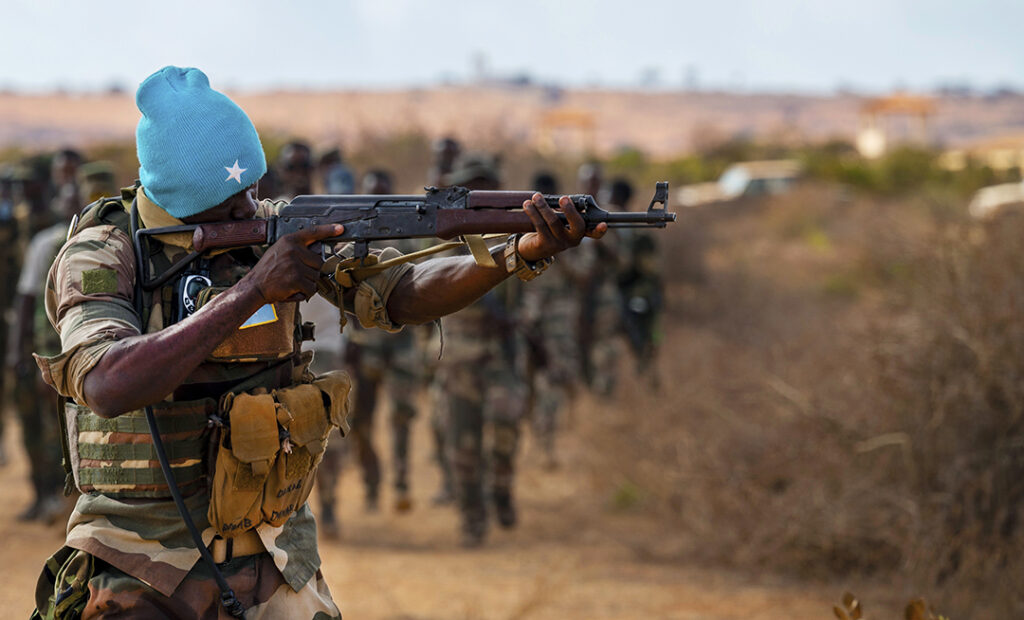ADF STAFF
For almost 10 years, the Danab Brigade, a unit of the Somali National Army, has been countering al-Shabaab attacks and winning a reputation as an elite fighting force.
Named after the Somali word for lightning, the 2,000-strong brigade was established in 2004 and initially was made up almost exclusively of people from the country’s poorest regions. Its public perception rising, the brigade in recent years has begun recruiting highly educated candidates.
Safia Abdinur, a young physician, is among them. Inspired to join after her friend was killed in a bombing, she was one of 19 college graduates recruited into the brigade in late 2022.
“We have been living in fear, but now things are different,” Abdinur told The Washington Post. “Now people are ready to fight.”
A 72-Hour Quick Strike Force
Once recruited, brigade members typically underwent three months of basic training by the U.S. Navy SEALs, followed by a month of special courses, such as shooting, navigating dense savannahs, raiding enemy camps, helicopter insertions and close-quarters combat.
Now the Somalis have grown more self-reliant and conduct up to 70% of the brigade’s basic training duties.
After basic training, recruits go home for a month-long breather before returning to Baledogle Air Base, about 100 kilometers northwest of Mogadishu, where the SEALs gave them crash courses in rappelling from helicopters and securing landing zones, Foreign Policy magazine reported.
Through expanded medical training, the brigade now saves more of its wounded Soldiers, with the ratio of dead to wounded falling by more than half over a recent 18-month period, Capt. Hassan Mohamed Mohamud, the physician who heads Danab’s medical corps, told The Washington Post.
The brigade constantly seeks about 350 new recruits at a time for training as fighters grow battle-weary.
“The Danab is a 72-hour quick strike force,” Will Meeker, the Africa director with the Center for Civilians in Conflict, told the magazine. “It’s not meant to do this again and again.”
After receiving their diplomas and getting their pictures taken with Somali military leaders, brigade members are sent to fight the notoriously violent, skilled and battle-ready al-Shabaab militants, who have controlled large swaths of Somalia since many in the brigade were children.
The formidable extremist group often hides in the savannah before launching surprise attacks. It employs complex improvised explosive devices, large truck bombs, rocket-propelled grenades and waves of suicide bombers in its attacks.
But the Danab Brigade has “grown to around battalion size and has been the only [Somali National Army] unit consistently able to perform offensive operations,” Paul Williams, an associate professor at George Washington University and author of several books on war in Africa, told Army Times.
The Danab, which often fights alongside local militias, is a major component of President Hassan Sheikh Mohamud’s plan to rid the country of al-Shabaab. Since August 2022, it has fought across about one-quarter of Somalia in the first phase of a military offensive against the group, clearing about 90% of al-Shabaab’s territory, Foreign Policy reported.
In August 2023, Somalia began an operation aimed at freeing three major districts in the central Somali province of Galmudug. If the operation is successful by late fall, the Danab will move south, toward Jubaland, the heart of al-Shabaab country, which has checkpoints protected by the African Union Transition Mission (ATMIS).
The hope is that al-Shabaab will be weakened enough that local clans can finish them off, the magazine reported.

